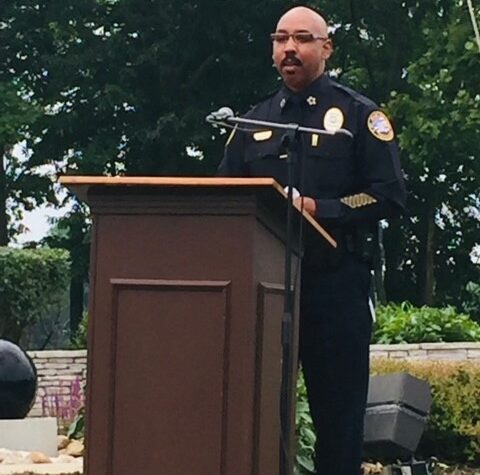Talk with Mt. Juliet Tennessee Chief of Police James Hambrick for just a few minutes and the words “community” and “communication” quickly come up in conversation.
As the leader of the police department in the growing Nashville suburb, Hambrick is focused on building a sense of community by being transparent in communication with the people under his watch.
And it all stems from his faith.
“God is my authority in all things, including our police work,” Hambrick said. “God guides everything I do.”
Serving the Mt Juliet Tennessee Community
Hambrick grew up in Nashville and is a 1979 graduate of Stratford High School; after serving in the Navy, he returned to Tennessee and eventually moved to Mt. Juliet where his wife grew up. He worked at a number of jobs in the Nashville area, including being a pastor (he was ordained in 1989), before settling on police work.
After serving as the department’s assistant chief of police from 2005 to 2012, Hambrick became Mt. Juliet’s chief of police and today has a special vision for the way work is done in the city.
The department’s vision statement says that the department “will be known for its community service orientation [and] effective crime prevention through community involvement” and it’s mission statement is that the department will “provide the highest quality service, in partnership with the community, to preserve and protect life and property through education, prevention, proactive problem solving, and enforcement.”
In Hambrick’s own words that means creating a bridge between his department and the people in Mt. Juliet.
“There is a disconnect, and people often see things as ‘us vs. them.’ As policemen, we want to say that ‘we ARE them.’ There needs to be a connection with the people we serve,” he said.
Hambrick believes that one of the best ways to create that connection is to have an open line of communication with the community he and his officers serve.
The department shares as much as possible on social media, and welcomes texts and phone calls from citizens.
“I’ve received some criticism for that, and people have said that we don’t need to share as much as we do,” he said, “but we want to be as open as possible. We have a platform to share as much as we feel like we can.”
“I’m dedicated to an informed community,” he said.
One of the trademark activities of the Mt. Juliet police department is its Coffee with a Cop program, which Hambrick started in 2013 as a part of his plan to communicate openly with the community. It’s still going strong almost a decade after its inception.
“Coffee with a Cop is something we’ve had great responses to over the years,” Hambrick said. “It’s just a chance for people to sit down and talk to one of us. It’s a simple thing.”
Of course, things aren’t always simple–and recent events have created challenges for the community-and-cop relationship.
After the killing of George Floyd in Minneapolis in 2020 and the ensuing protests around the country, Hambrick knew it was important for him to engage with those concerned about the issue of police brutality.
He, despite criticism from some, appeared at a Black Lives Matter gathering in Mt. Juliet to let protestors know he understood their fears and concerns. That group has since changed its name to Peace, Love, Justice–Mt. Juliet and continues to work for peaceful reform.
“Everything starts with an open dialogue, and I take any opportunity I can to reach out, including during that time,” Hambrick said. “We want to let people know that we hear them.”
Another recent challenge has been the spate of mass shootings, including the one at an elementary school in Uvalde, Texas in May.
While Mt. Juliet–located in western Wilson County, just 17 miles from downtown Nashville–is a relatively peaceful town with rare instances of violent crime, Hambrick knows that people fear such situations. In times like these, he said that community engagement is yet again important.
He wants local citizens to know that the police department has policy and plans in place for such situations, and also that they can communicate with their local police officers about any concerns or threats they may want to share.
In all situations, Hambrick said that he and his fellow officers want to be as “approachable, respectable, and visible as we can be.”
Finding his Purpose
Hambrick was raised in a Christian home and attended church regularly, but said he drifted from the kind of life he knew a believer should live.
“I got as far away as possible from it,” he remembered. “I drank, spoke with vulgar words. My family told me I needed to get back in church.”
According to Hambrick, his relationship with God was restored and he began looking for ways he could serve.
“I asked God for a genuine relationship, and an understanding of his word,” he said. “Then, everything changed.”
God’s leading on his life has brought Hambrick to places he never imagined–including the one that brought him to his current career.
Hambrick’s road to becoming a police officer is one filled with serendipitous situations and an understanding of the Holy Spirit’s leading in his life.
In the mid-1990s Hambrick worked nights at a Mapco gas station in Mt. Juliet just off the interstate; some of his regular customers included police officers.
“They’d talk with me about my work, and they knew I’d been in the Navy,” he recalled. “They told me that I’d make a good officer, and they kept telling me that I should apply to the department, but I kept putting them off.”
One of the officers that encouraged him to join the force was Sgt. Jerry Mundy, who was killed in the line of duty in 2003; Hambrick still remembers his encouragement.
“I’d never thought about working as a police officer, but they made an impression on me. So I prayed about it,” he said. It took a while, but Hambrick got clarification from his prayers and started work with the department, beginning as a dispatcher and then a patrolman; he also has served as a chaplain for the department.
Today, Hambrick’s purpose extends beyond his work as a police chief and into his ministry as a local pastor and a musician.
Hambrick currently serves as a co-pastor at Cloyd’s Cumberland Presbyterian Church in Mt. Juliet, a position he’s held for the last four years, and also serves as a co-shot of “The Odd Couple” podcast (where has shared stories from his years on the police force); he also performs as a musician in different settings.
He can be found singing at church, with choirs, at weddings and other events; he also plays the drums, enjoys R&B music, and has recently released a debut CD of his music.
While he often sings gospel music in worship settings, his new CD may surprise people–it’s a collection of country music songs, written in collaboration with well-known songwriters Don Poythress and Leslie Satcher (who have written for such singers as Willie Nelson, Blake Shelton, and Vince Gill).
The musical project evolved from Hambrick’s podcast, which Poythress listened to and then approached the police chief about writing songs inspired by his police stories. The resulting collection includes eight songs written by Hambrick, Poythres, and Satcher; the title track, “Somebody’s Gotta Tell Them,” stems from Hambrick’s experiences in having to deliver sad news to families of victims.
His musical career, Hambrick said, is another example of God’s provision and leading in new directions.
“The new CD is just a God thing,” he said. ‘It’s another opportunity for me to share my music with others.”
Looking to the Future
Today, Hambrick and his wife Denise enjoy their roles as police chief, pastor, and spouse–and as leaders of their large and growing family.
Most of his family still resides in the Nashville area and he enjoys spending time with his five children, 14 grandchildren, and one great grandchild.
And in Mt. Juliet?
“Our community is diverse and strong,” he said. “We’re a peaceful town, but there’s a lot of growth in the area and new people are moving in all the time. We have challenges, just like anywhere.”
He said he will continue to stay dedicated to doing everything he can to build a strong sense of community–between churches, schools, businesses, individuals, and the police department–to make a real difference.
“We can only do things together,” he said. “‘Relationship’ is the key word. Whether it’s in police work or with our faith.”Cheryl Wray is a freelance writer, author, and director of the Southern Christian Writers Conference














